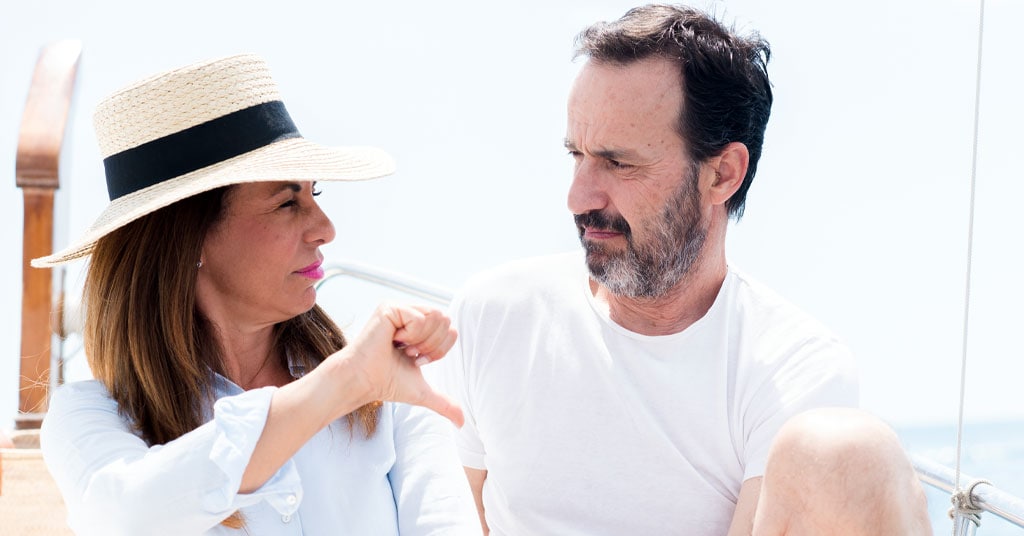I’ll bet you have certain ways of doing things. And when someone else does something differently, it seems wrong to you.
Do you say something to the other person, or not?
Years ago, I heard the phrase “6 + 1 = 7, but so does 3 + 4.” In other words, there’s more than one way to get to the same result.
If a different way doesn’t create a safety issue, who am I to say it’s wrong?
Yes, I may think my way is easier or better. But “correcting” someone too many times leads to hurt feelings and no fun. “I’ll never learn this!” gets yelled; stress levels skyrocket. And things go further downhill.
Dave and I both began sailing in our teens, long before we knew each other. And we are both pretty mechanical, but with very different ways of analyzing problems. We do many things very differently. And neither one of us really wants the other one giving “suggestions” . . . unless we ask.
Most of the time, neither one of us is “right” and the other “wrong” but we have been known to wonder just exactly what the other was doing. His go-to screwdriver is different than mine. He prefers a different nozzle on the vacuum. And so on.
It comes down to a simple question: is the other person just doing it differently, but getting the same result? Simply taking more time to figure things out for themselves isn’t a reason, in and of itself, to take over.
In fact, I’d even argue that doing things differently can be an asset. More than once, one of us has noticed a problem — or potential problem — that the other one hadn’t, simply because we did something a little differently. And sometimes, the other person discovers an easier way to do something.
Admittedly, sometimes it is important that “everyone” do something the same way, generally for safety reasons. Say cleating off a dock line, so that someone else can quickly uncleat it in the dark if there is an emergency. Or putting the engine key in a particular place so it’s quick to grab if needed. It’s not really that one way is better, but rather that everyone has to agree to do it the same way.
Other times, a different way of doing something may result in gear breakage or put someone in danger of an injury. Then they’re not getting the same result and discussion is in order.
All that said, I’m far from perfect. Dave would tell you I give unsolicited advice far too often (I might say the same about him . . .). I try to remember that it’s the result that’s important and not how we get there. And keeping the stress level down is more enjoyable for everyone.
And while I think of “6 + 1 = 3 + 4” primarily as Dave and I interact with each other on our boat, it applies more broadly to cruising in general, too. There’s no one “right” boat or even a right size. I have friends cruising on 28-footers and others on 60-footers. Some are sailboats, some power. Same may cruise a week at a time, others a month and still others full time. Everyone has a different budget. Yet we all end up in the same harbor, sharing friendship, help and support. It doesn’t matter how we got there, just that we did.

Carolyn Shearlock has lived aboard full-time for 17 years, splitting her time between a Tayana 37 monohull and a Gemini 105 catamaran. She’s cruised over 14,000 miles, from Pacific Mexico and Central America to Florida and the Bahamas, gaining firsthand experience with the joys and challenges of life on the water.
Through The Boat Galley, Carolyn has helped thousands of people explore, prepare for, and enjoy life afloat. She shares her expertise as an instructor at Cruisers University, in leading boating publications, and through her bestselling book, The Boat Galley Cookbook. She is passionate about helping others embark on their liveaboard journey—making life on the water simpler, safer, and more enjoyable.

ALEX TODD says
My time as an Army officer, department head, and now executive director, I have learned through hard experience that no one will do something exactly how you want/wish/prefer they’d do it. So I focus on the end result – did what needs getting done get done? If yes, I’m inclined to give my folks lots of leeway with the process slide.
Tom Samuelson says
Typically speaking, an old Christian minister once told me. When it comes to marriage, do you want to be RIGHT or do you want to be Happy!!!!!!!!
Montana Inkfish says
This fits a lot of things in life and not just boating.
Thanks.
Karen Marciano says
I love this post. I’ve always been on the “what are the results” team. And I just love the 6+1 example. I’ll be repeating this a lot! Thanks.
Cara Jones says
We have a crew who tries to take over most things (on our small race crew; club racing). “Simply taking more time to figure things out for themselves isn’t a reason, in and of itself, to take over.” will be a line I use from now on. Sure, we’re racing, but no money or glory is involved!
When this crew ‘takes over’, it’s demoralizing and makes me second-guess myself. On a bad day, a ‘takeover’ makes me feel incompetent – I hesitate to make any decision and simply await instruction. I learn from experience and need to try for myself. Any explanation from me often gets a “Yeah, but you didn’t , so your way won’t work.” Ugh.
Thank you for this excellent post.
Cara Jones says
My post should read, “Yeah, but you didn’t consider (this piece of input), so your way won’t work”
Eve says
Such true words, for boating and for life. I wish I had learned that lesson a long time ago!
Betsy says
We are just purchasing our first boat together…and I KNOW this is going to come up 11nty thousand times!!! I’m a lefty…and I do things backwards…a lot!!! I am going to practice “Man Over Board” !! 🙂